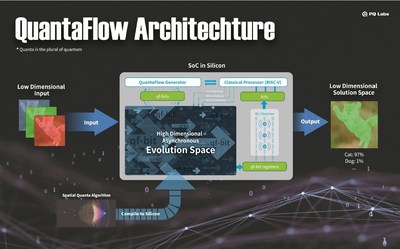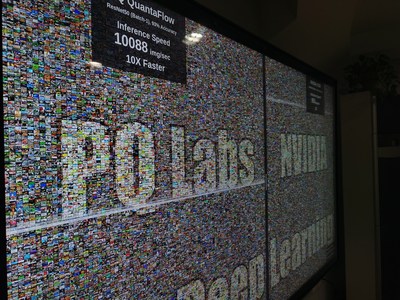"Quanta" is the plural of quantum. QuantaFlow AI SoC architecture is designed to simulate massive parallel transformation / evolution that is very similar to Quantum Computation.
Quantum Computing is based on continuous unitary transformation of qu-bits. A qu-bit (quantum bit) can represent different possible states (e.g. a cat being mathematically both live and dead at the same time). Like the classical computing model, quantum computing also has 3 major procedures: Input, Process and Output. But unlike the classical model, the process part of quantum computing is done by continuous transformation / Evolution other than step by step read-control-writeback of a classical Turing machine. There is no observation (read/writeback) until the final stage.
In reality, quantum computers are still far far away from practical use. Even after Google's Quantum Supremacy, very little algorithms can be run and none of them have real-world applications. QRAM (quantum RAM) only exists in theory. Qu-bits are fragile, which need error-correction. This may not be an issue for a few small lab experiments with a few qu-bits. But to do something productive, one billion error-correcting qubits is needed just to get 1,000 functional qubits, according to the Nature Magazine.
In face of such tech difficulties, other approaches of quantum-like computation are being explored. For example, Canadian tech startup D-Wave announced its 5,000 qu-bits quantum annealer computer in 2019. However, scientists argue that D-Wave's computer is not "true quantum," but a quantum algorithm and quantum simulation. Despite the academic debate, D-Wave is the world's first "quantum computer" that solves actual problems such as drug molecule classification, ads optimization, etc. However, the computer is huge and cost about $15 Millions, thus lack of mass adoption.
There are other approaches trying to bridge the gaps between Quantum-style algorithm implementations into real silicon of Artificial Intelligence. QuantaFlow is the answer from PQ Labs, Inc.
QuantaFlow simulates a virtual transformation / evolution space for qf-bit registers. A classical single-core RISC-V processor is implemented to provide logical control, results observation retrieval, etc. The QuantaFlow Generator converts input data from low dimensional space to high dimensional space and then starts continuous transformation / evolution. The process is of minimum granularity, highly parallel in nature and asynchronous. By the end of the process information needs to be extracted from the evolution space by Bit Observer unit. In addition, Hot-Patching can be used to change the evolution path of qf-bits dynamically. When a more significant deformation for the evolution space are needed, the RISC-V processor will issue a warm-"reboot" to the evolution space. All these operations can be executed in a blink of time. With the help of these dynamic operations, QuantaFlow is possible to run all kinds of neural network models e.g. ResNet-50 (2015), MobileNet (2017), EfficientNet (2019), etc.) without speed degradation or hitting the "memory wall." By comparison, GPUs and ASIC AI accelerators degrade performance in newer models (MobileNet, EfficientNet), because these new models are all memory-bound.
QuantaFlow architecture is just a one-step further to explorer superior performance in AI deep learning inference. There are many devils in the details and innovation areas. For example, QuantaFlow architecture design flow are accelerated by high level languages (instead of using Verilog) and implementation is optimized by in-house algorithms to extract maximum horsepower from silicon.
With all the above effort, QuantaFlow can achieve 10X speedup in ResNet-50 (batch=1, accuracy=93%, INT8) compared to Nvidia V100 in the same network configuration. For newer network models, there will be significantly higher speedup to be announced.
For more information please visit http://www.pqlabs.ai.


![]() View original content to download multimedia:
http://www.prnewswire.com/news-releases/ces-2020-ai--quantum-flow-boosts-deep-learning-speed-10x---15x-faster---powered-by-pqlabsai-300983793.html
View original content to download multimedia:
http://www.prnewswire.com/news-releases/ces-2020-ai--quantum-flow-boosts-deep-learning-speed-10x---15x-faster---powered-by-pqlabsai-300983793.html
SOURCE PQ Labs
| Contact: |
| Company Name: PQ Labs
Web: http://www.pqlabs.ai |









